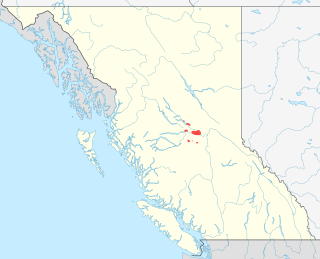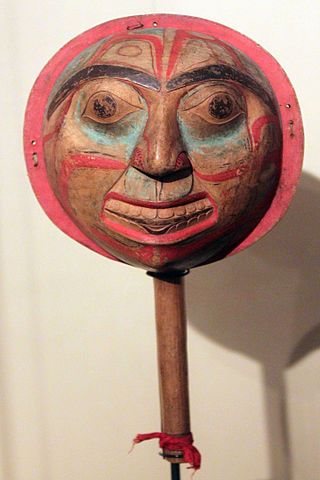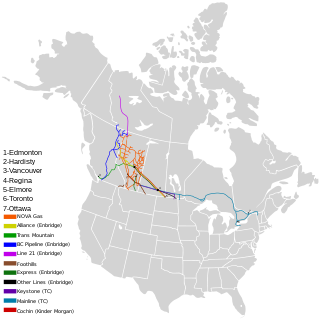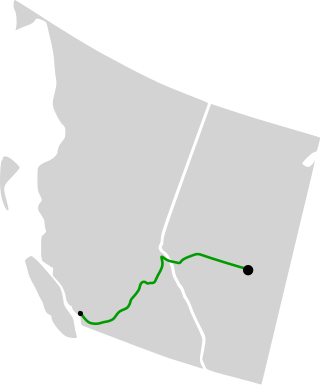Related Research Articles

The Dakelh or Carrier are the indigenous people of a large portion of the Central Interior of British Columbia, Canada. Another name the Dakelh/Carrier call themselves is Yinka Dene, the Babine-Witsuwitʼen-speaking bands prefer the equivalent Yinka Whut'en.
Enbridge Inc. is a Canadian multinational pipeline and energy company headquartered in Calgary, Alberta, Canada. Enbridge owns and operates pipelines throughout Canada and the United States, transporting crude oil, natural gas, and natural gas liquids, and also generates renewable energy. Enbridge's pipeline system is the longest in North America and the largest oil export pipeline network in the world. Its crude oil system consists of 28,661 kilometres of pipelines. Its 38,300 kilometre natural gas pipeline system connects multiple Canadian provinces, several US states, and the Gulf of Mexico. The company was formed by Imperial Oil in 1949 as the Interprovincial Pipe Line Company Limited to transport Alberta oil to refineries. Over time, it has grown through acquisition of other existing pipeline companies and the expansion of their projects.
The Enbridge Pipeline System is an oil pipeline system which transports crude oil and dilbit from Canada to the United States. The system exceeds 5,000 kilometres (3,100 mi) in length including multiple paths. More than 3,000 kilometres (1,900 mi) of the system is in the United States while the rest is in Canada and serves the Athabasca oil sands production facilities. Main parts of the system are 2,306-kilometre-long (1,433 mi) Canadian Mainline and 3,057-kilometre-long (1,900 mi) Lakehead System. On average, it delivers 1.4 million barrels per day of crude oil and other products to the major oil refineries in the American Midwest and the Canadian province of Ontario. The Canadian portion is owned by Enbridge, while the U.S. portion is partly owned by that company through Enbridge Energy Partners, LP, formerly known as Lakehead Pipe Line Partners and Lakehead Pipe Line Company.

The Dakelh (ᑕᗸᒡ) or Carrier language is a Northern Athabaskan language. It is named after the Dakelh people, a First Nations people of the Central Interior of British Columbia, Canada, for whom Carrier has been a common English name derived from French explorers naming of the people. Dakelh people speak two related languages. One, Babine-Witsuwit'en, is sometimes referred to as Northern Carrier. The other includes what are sometimes referred to as Central Carrier and Southern Carrier.

Stuart Lake, or Nak'albun in the Carrier (Dakelh) language is a lake situated in the Northern Interior of British Columbia, Canada. The town of Fort St. James is situated by the lake near the outlet. Stuart Lake is 66 kilometres (41 mi) long, 10 kilometres (6.2 mi) wide and relatively shallow, with an average depth of 26 metres (85 ft). There are several privately owned islands on Stuart lake.

The Heiltsuk Nation is a First Nations government in the Central Coast region of the Canadian province of British Columbia, centred on Campbell Island in the community of Bella Bella, British Columbia. The Heiltsuk people speak the Heiltsuk language, and were, like their language, and along with the neighbouring Haisla and Wuikinuxv (Owekeeno) peoples, incorrectly known in the past as the "Northern Kwakiutl". The Heiltsuk were also known as the Bella Bella, after their core community.
Mary John Sr. CM was a leader of the Carrier people of the central interior of British Columbia in Canada. She was known as "Mary John Sr." to distinguish her from her daughter-in-law, also named Mary John. She became well known both for her political and social activism and as a role model, a person of enormous integrity, strength, and gentleness.
The Carrier Sekani Tribal Council is a tribal council representing six First Nations in the Central Interior of British Columbia. It was originally known as the Lakes District Tribal Council. The CSTC was incorporated in 1981 and is a registered non-profit society.

The Nadleh Whut'en First Nation is a First Nations government of the Dakelh people, whose territory is located in the Central Interior of British Columbia, Canada, around the east end of Fraser Lake. The nation has seven reserves which Crown-Indigenous Relations and Northern Development Canada refer to as IR#1-9.. Until 1990, it was referred to as the Fraser Lake Indian Band.
Dogwood BC is a Canadian non-profit public interest group based in Victoria, British Columbia. The organization works to increase the power of British Columbians over government decision-making. They were instrumental in the fight against Enbridge's Northern Gateway pipeline, introducing a tanker moratorium on B.C.'s north coast and the province's campaign finance reform. The organization currently works to stop Kinder Morgan's Trans Mountain tanker and pipeline expansion in B.C., ban U.S. thermal coal exports through B.C. ports and restore accountability and transparency to the province's democracy by calling for a Corruption Inquiry.
The Enbridge Northern Gateway Pipelines were a planned-but-never-built project for a twin pipeline from Bruderheim, Alberta, to Kitimat, British Columbia. The project was active from the mid-2000s to 2016. The eastbound pipeline would have imported natural gas condensate, and the westbound pipeline would have exported diluted bitumen from the Athabasca oil sands to a marine terminal in Kitimat for transportation to Asian markets via oil tankers. The project would have also included terminal facilities with "integrated marine infrastructure at tidewater to accommodate loading and unloading of oil and condensate tankers, and marine transportation of oil and condensate." The CA$7.9 billion project was first proposed in the mid-2000s but was postponed several times. The project plan was developed by Enbridge Inc., a Canadian crude oil and liquids pipeline and storage company.

The National Energy Board was an independent economic regulatory agency created in 1959 by the Government of Canada to oversee "international and inter-provincial aspects of the oil, gas and electric utility industries." Its head office was located in Calgary, Alberta.

Idle No More is an ongoing protest movement, founded in December 2012 by four women: three First Nations women and one non-Native ally. It is a grassroots movement among the Indigenous peoples in Canada comprising the First Nations, Métis and Inuit peoples and their non-Indigenous supporters in Canada, and to a lesser extent, internationally. It has consisted of a number of political actions worldwide, inspired in part by the liquid diet hunger strike of Attawapiskat Chief Theresa Spence and further coordinated via social media. A reaction to alleged legislative abuses of Indigenous treaty rights by then Prime Minister Stephen Harper and the Conservative federal government, the movement takes particular issue with the omnibus bill Bill C-45. The popular movement has included round dances in public places and blockades of rail lines.
Tidewater is a term used by industries and governments to refer to access to ocean ports with international marine services for import and export of commodities. For export, the commodities can be shipped via trucks, trains and/or pipelines to a port, thereby opening the door to more lucrative prices on global markets. Getting to such a port is particularly important for landlocked jurisdictions seeking to expand and diversify markets for natural resources.

The Trans Mountain Pipeline System, or simply the Trans Mountain Pipeline (TMPL), is a multiple product pipeline system that carries crude and refined products from Edmonton, Alberta, to the coast of British Columbia, Canada.

The Unistʼotʼen Camp is a protest camp and indigenous healing centre in northern British Columbia, Canada. It is located within the traditional territory of the Unist'otʼen clan of the Wetʼsuwetʼen First Nation peoples. Established after the proposal of several pipeline projects in the area, it is situated where several pipelines will pass, as a means to block their construction.

The Coastal GasLink pipeline is a TC Energy natural gas pipeline under construction in British Columbia, Canada. Starting in Dawson Creek, the pipeline's route crosses through the Canadian Rockies and other mountain ranges to Kitimat, where the gas will be exported to Asian customers. Its route passes through several First Nations peoples' traditional lands, including some that are unceded. Controversy around the project has highlighted divisions within the leadership structure of impacted First Nations: elected band councils support the project, but traditional hereditary chiefs of the Wetʼsuwetʼen people oppose the project on ecological grounds and organized blockades to obstruct construction on their traditional land. Wetʼsuwetʼen people opposed to the pipeline argue that they have a relationship with the land that the Coastal GasLink pipeline construction threatens.
The following is a timeline of the 2020 Canadian pipeline and railway protests which originated with the opposition by the hereditary chiefs of the Wetʼsuwetʼen people in British Columbia (BC), Canada to the Coastal GasLink Pipeline project.
From January to March 2020, a series of civil disobedience protests were held in Canada over the construction of the Coastal GasLink Pipeline (CGL) through 190 kilometres (120 mi) of Wetʼsuwetʼen First Nation territory in British Columbia (BC), land that is unceded. Other concerns of the protesters were Indigenous land rights, the actions of police, land conservation, and the environmental impact of energy projects.
The Van der Peet test or the Integral to a Distinctive Culture Test is a legal test used in Canada to determine whether an activity is considered an "Aboriginal right" under section 35 of the Canadian Constitution. The test was established in the landmark Supreme Court of Canada case R. v. Van der Peet (1996). The test has three parts, which must all be satisfied for the activity to be considered an Aboriginal right:
- The practice, custom, or tradition must be an element of a practice, custom, or tradition integral to the distinctive culture of the Aboriginal group claiming the right.
- The practice, custom, or tradition must have existed prior to contact with Europeans.
- The practice, custom, or tradition must have been central to Aboriginal society's way of life.
References
- ↑ "About the Yinka Dene Alliance". Yinka Dene Alliance.
- 1 2 "First Nations in Alberta & NWT Sign Save the Fraser Declaration Opposing the Proposed Enbridge Pipeline and Tankers Project". Reuters. 27 January 2012. Archived from the original on 20 December 2013.
- 1 2 "The issue: Enbridge's proposed Northern Gateway pipeline and tanker project threatens North America". Forest Ethics.
- 1 2 Walkom, Thomas (9 May 2012). "Walkom: Northern Gateway pipeline faces 'unbreakable' wall". The Star.
- ↑ "About the Freedom Train". Yinka Dene Alliance.
- ↑ Flanagan, Tom (21 February 2012). "First nations don't have a pipeline veto, but they do have options". The Global and Mail. Retrieved 20 May 2012.
- ↑ "Save The Fraser Declaration" (PDF).
- ↑ "Save The Fraser Declaration". Yinka Dene Alliance.
- ↑ "B.C. natives protest Enbridge pipeline". CBC News. 2 December 2010. Retrieved 14 May 2012.
- ↑ Ljunggren, David, and Jeffrey Jones (1 December 2011). "Natives to oppose West Coast oil pipelines". Reuters.
{{cite news}}: CS1 maint: multiple names: authors list (link) - ↑ Stoymenoff, Alexis (6 February 2012). "Aboriginal pipeline opponents seek support from China". Vancouver Observer.
- ↑ "Open letter to His Excellency President Hu Jintao" (PDF). Yinka Dene Alliance.
- ↑ "Open letter to the Chinese people from the Yinka Dene Alliance of First Nations in British Columbia, Canada" (PDF). Yinka Dene Alliance.
- ↑ "Submission to United Nations Committee on the Elimination of Racial Discrimination" (PDF). Yinka Dene Alliance.
- ↑ "Enbridge Complaint to United Nations: First Nations File Complaint That Harper Government Racism on Pipelines Violates International Law". Marketwire. 24 February 2012.
- ↑ "People on the Train". Yinka Dene Alliance.
- ↑ "Schedule/Events". Yinka Dene Alliance.
- 1 2 Lukacs, Martin, and Tim Groves (9 May 2012). "RCMP spied on B.C. natives protesting pipeline plan, documents show". The Star.
{{cite news}}: CS1 maint: multiple names: authors list (link)